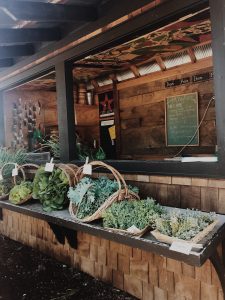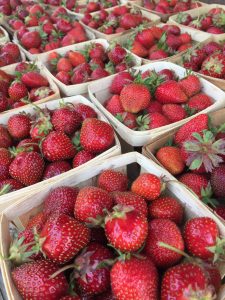By Madison Ostrander, Hope College ’17 and Eighth Day Farm Intern

I spend my days interning on a farm in the middle of a parking lot learning about the intricacies and practices of urban farming. I’m a recent college graduate with a passion for food and an itch to learn more about agriculture, especially as it pertains to food justice, community development, and sustainability.
Through getting to know the farmers, sampling each flavor-bursting harvest, and becoming acquainted with our natural growing practices, I have been thoroughly convinced of the benefits of buying locally grown food or even starting a home garden.
Although many people experience barriers to buying local produce, such as work schedules, constrained budgets, and lack of growing space, it is my hope that sharing the following benefits and presenting doable alternatives will serve as motivating food for thought resulting in progressive change.
Aside from providing more irresistible summer salads and savory stir fries, supporting local growers also has profound health, environmental, and economic benefits.

Who can forget an unfortunate run-in with over-ripe or otherwise displeasing produce from a grocery store? Growing your own food or buying from local farmers has the exciting potential to relieve us from such disappointments.
In addition to improved quality, many believe consuming locally-grown food is better for your health. At larger farms, mechanical harvesting often precedes long transport to the grocery store. Some crops may not have been harvested at their peak ripeness, when they retain the most nutrients. Locally grown produce can be picked at peak ripeness, as it doesn’t need artificial ripening or the ability to withstand a cross-country road trip.
Those cross-country trips don’t only signal a longer wait time from the farm to your fork; they also damage the environment through greenhouse gas emissions. And local farmers can use less packaging than those supplying grocery stores. Note, for example, the unnecessarily plastic-wrapped cucumbers, peppers, tomatoes, and so on.
The health of our bodies and environment is important, but so is that of our economy. Holland recognizes the importance of its small businesses, as our community values both their stories as well as their ability to stimulate Holland’s economy. Well, I suggest you buy local produce for the same reasons.
You can eat local in many ways: Holland is home to produce stands, Holland Farmers Market, CSAs, and community gardens.
The Holland Farmers Market is open on Wednesdays and Saturdays from 8 a.m. to 3 p.m. Tents stretch over flowers, baked goods, and of course, vibrant in-season produce. Bridge Cards also can be used.
Another option is joining a CSA, short for Community Supported Agriculture. In a CSA, members pay an annual fee in exchange for an abundance of seasonal produce and the opportunity to know their farmer.
Eating local is certainly food for thought.
Madison Ostrander is an intern at Eighth Day Farm, a local urban farm focused on creation care and natural growing practices. A recent business and writing graduate from Hope College, she aspires to team her interest in writing with her passion for both wellness and sustainability in her future career.
![]() This Week’s Sustainability Framework Theme
This Week’s Sustainability Framework Theme
Environmental Awareness/Action: Environmental education and integrating environmental practices into our planning will change negative outcomes of the past and improve our future.
![]() ABOUT THIS SERIES
ABOUT THIS SERIES
Living Sustainably is a collection of community voices sharing updates about local sustainability initiatives. It is presented by the Holland-Hope College Sustainability Institute, a joint project of Hope College, the City of Holland and Holland Board of Public Works. Go to www.hope.edu/sustainability-institute for more information.

